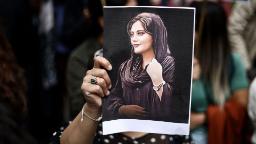
CNN
—
Iranian authorities say they will restrict internet access in the country until calm is restored to the streets, as protests over the death of a young woman in the custody of the morality police rock the Islamic Republic.
Thousands of Iranians have taken to the streets in protest since the death last week of 22-year-old Mahsa Amini, who was apprehended in Tehran and taken to a “re-education center”, apparently for not wearing her hijab properly.
Since Friday, demonstrations have taken place in at least 40 cities nationwide, including the capital Tehran, with protesters demanding an end to violence and discrimination against women as well as an end to compulsory wearing of the hijab.
Dozens of protesters have reportedly been killed in the resulting clashes with security forces.
CNN cannot independently verify the death toll – a precise figure is impossible for anyone outside the Iranian government to confirm – and different estimates have been given by opposition groups, international rights organizations and local journalists. Amnesty International said Friday that at least 30 people, including four children, had died; according to state media the Islamic Republic of Iran Broadcasting, 35 people have died.
Authorities hope that by restricting the internet they can bring the protests under control.
Speaking with state broadcaster IRIB on Friday, Iran’s Minister of Communications Ahmad Vahidi said, “Until the riots end, the internet will have limitations. To prevent riot organization through social media, we are obliged to create internet limitations.”
Vahidi’s comments came after videos on social media showed scenes of public defiance, with women removing and burning their headscarves and demonstrators chanting such slogans as, “women, life, freedom.”
The move to further restrict the internet also followed a call by the United Nations for an independent investigation into Amini’s death and for Iran’s security forces to refrain from using “disproportionate force” on the protesters.
Outrage over Amini’s death comes from public skepticism over the account given by state officials, who claim she died after suffering a “heart attack” and fell into a coma. But Amini’s family have said she had no pre-existing heart condition.
Amini’s death has now become a symbol of the violent oppression women have faced in Iran for decades, and her name has spread around the globe, with world leaders invoking her even at the United Nations General Assembly in New York City this week.
The United Nations High Commissioner for Human Rights on Thursday said UN experts strongly condemned the use of physical violence against women in Iran by state authorities.
“Iranian authorities said (Amini) died of a heart attack, and claimed her death was from natural causes. However, some reports suggested that Amini’s death was a result of alleged torture and ill-treatment,” it said in a statement.
“We call on the Iranian authorities to hold an independent, impartial, and prompt investigation into Ms Amini’s death, make the findings of the investigation public and hold all perpetrators accountable,” it added.
The internet monitoring agency Netblocks said Friday Iranians are facing a third wave of “nation-scale” loss of mobile internet connectivity as the protests continue.
The watchdog group said earlier in the week that Iran was experiencing the most severe internet restrictions since 2019, with mobile networks largely shutdown and social networks Instagram and WhatsApp restricted in the country since protests began.
To circumvent internet blocks, Iranians both inside the country and in the diaspora are turning to popular Virtual Private Network (VPN) providers such as Tor Project and Hula VPN – the top downloaded apps available in Iran via Google Play Store, a marketplace for Android smartphone users to download apps, according to monitoring service AppBrain.
However, Netblocks has warned that the kind of internet disruption seen currently in the country “cannot generally be worked around with the use of circumvention software or VPNs.”
Similar internet restrictions took place in Iran in November 2019, taking Iranians almost entirely offline as authorities tried to curb the spread of nationwide protests over fuel prices.
Oracle’s Internet Intelligence called it at the time the “largest internet shutdown ever observed in Iran.”
Meanwhile, Internet activist hacker group Anonymous has also targeted the Iranian government online over the past week, announcing several breaches of government websites on Thursday.
Using the hashtag #OpIran, short for Operation Iran, which started gaining traction on social media following the death of Amini, Anonymous also tweeted Thursday that the organization was successful in hacking more than 1,000 CCTV Iranian cameras – a claim CNN has not been able to independently confirm.
UN Secretary General António Guterres said Friday he was “concerned about reports of peaceful protests being met with excessive use of force leading to dozens of deaths and injuries.”
“We call on the security forces to refrain from using unnecessary or disproportionate force and appeal to all to exercise restraint to avoid further escalation,” Dujarric said at the daily briefing on UNTV.
The UN said it’s closely following the protests in Iran and called on authorities to “respect the right to freedoms of expression, peaceful assembly and association.”
“We also call on the authorities to respect women’s rights and to eliminate all forms of discrimination against women and girls and implement effective measures to protect them from other human rights violations, in accordance with international standards.”
Guterres reiterated a call from the Acting High Commissioner for Human Rights for a prompt investigation into the death of Amini by an “independent competent authority.”




